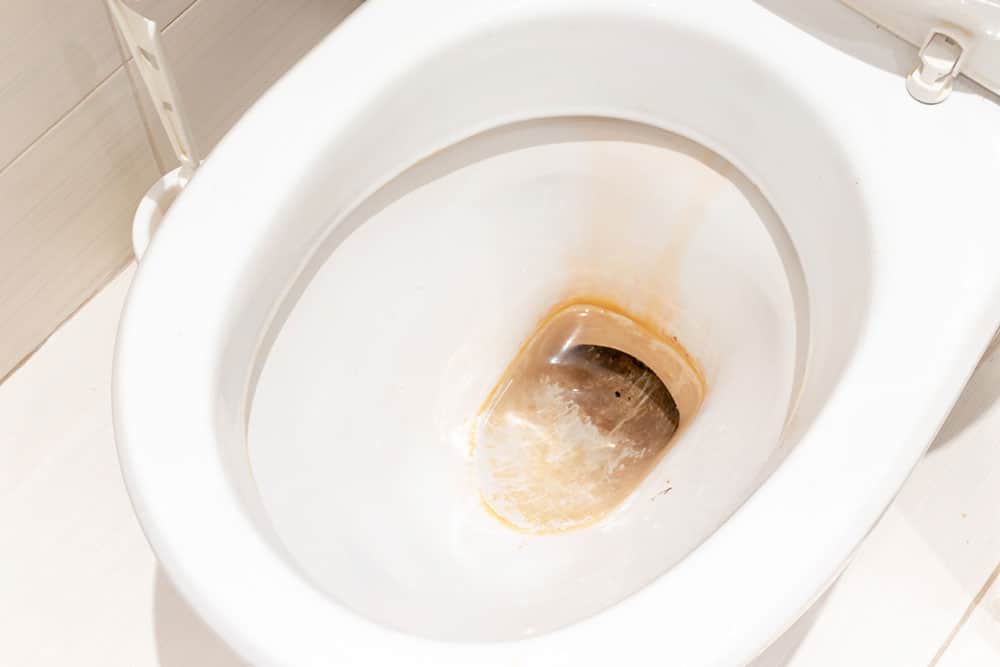Hard water stains in toilets can be a persistent and unsightly problem, affecting not only the appearance of your bathroom but also the efficiency of your toilet. Hard water contains high levels of minerals like calcium and magnesium, which can leave stubborn deposits on porcelain surfaces. In this comprehensive guide, we will explore the causes of hard water stains, preventative measures, and delve into various effective methods to tackle hard water stains and restore the cleanliness of your toilet.
Understanding Hard Water Stains:
Hard water stains are the result of mineral deposits that accumulate over time on toilet surfaces due to the minerals present in the water supply.
Calcium and magnesium are the primary culprits, and they can manifest as discolored patches or rings in the bowl, making the toilet look unsightly.
Prevention is Key:
Preventing hard water stains is often more manageable than trying to remove them later. Consider installing a water softener to reduce the mineral content in your water supply.
Water softeners work by exchanging calcium and magnesium ions with sodium ions, significantly minimizing the occurrence of hard water stains in your toilet.
Regular Cleaning with Vinegar:
White vinegar is a versatile and eco-friendly solution for removing hard water stains. The acetic acid in vinegar helps dissolve mineral deposits. To use vinegar, mix equal parts of white vinegar and water and apply the solution to the stained areas.
Allow it to sit for at least 30 minutes before scrubbing with a toilet brush. This method is not only effective but also budget-friendly.
Lemon Juice for a Citrusy Clean:
Lemon juice is another natural remedy for hard water stains due to its citric acid content. The acid works to break down mineral deposits. Squeeze fresh lemon juice into the toilet bowl, concentrating on the stained areas.
Allow it to sit for a while before scrubbing with a toilet brush. Besides its cleaning properties, the natural citrus fragrance leaves your bathroom smelling fresh.
Baking Soda and Vinegar Combo:
Create a powerful cleaning paste by combining baking soda and white vinegar. Baking soda’s mild abrasiveness, combined with the foaming action of vinegar, helps break down and lift hard water deposits.
Apply the paste to the stained areas, allowing it to fizz for 15-20 minutes. Scrub the toilet bowl with a brush, and flush to reveal a cleaner surface.
Commercial Cleaners for Tough Stains:
When home remedies fall short, commercial cleaners designed specifically for hard water stain removal can be effective. Follow the product instructions carefully, wear protective gloves, and ensure proper ventilation when using these products.
Some commercial cleaners contain stronger acids or detergents that can efficiently dissolve and remove stubborn stains.
Pumice Stone for Stubborn Stains:
For exceptionally tough stains that resist other cleaning agents, a pumice stone can be a gentle yet effective solution. Wet the stone and gently scrub the stained areas, taking care not to scratch the porcelain surface.
The pumice stone acts as a natural abrasive, helping to lift away stubborn mineral deposits.
Regular Maintenance Tips:
Prevent the recurrence of hard water stains by incorporating regular toilet cleaning into your household routine. Consider using a water repellent coating on the toilet bowl, creating a protective barrier against mineral deposits.
Additionally, adopting a weekly cleaning schedule can help keep hard water stains at bay.
FAQs
Q1: Why do hard water stains occur in toilets?
A: Hard water stains occur due to the high mineral content, primarily calcium and magnesium, in the water supply, leading to deposits on toilet surfaces.
Q2: Can hard water stains be prevented?
A: Yes, installing a water softener is an effective preventive measure, reducing mineral content in the water and minimizing stains.
Q3: How often should I clean my toilet to prevent hard water stains?
A: Aim for at least once a week using mild cleaning solutions like vinegar or lemon juice to prevent hard water stains.
Q4: Is there any eco-friendly solution for removing hard water stains?
A: Yes, white vinegar and lemon juice are eco-friendly solutions that can dissolve hard water stains effectively.
Q5: Are commercial cleaners safe to use in toilets?
A: Yes, when used according to instructions, commercial cleaners designed for hard water stains are safe, but protective gloves and proper ventilation are essential.
Q6: Can I use a pumice stone on all toilet bowl surfaces?
A: Use a wet pumice stone with caution to avoid scratching the porcelain surface when tackling stubborn stains.
Q7: How long does it take for vinegar or lemon juice to remove hard water stains?
A: Allow at least 30 minutes for vinegar or lemon juice to sit on stains before scrubbing; longer for tougher stains.
Q8: Can hard water stains damage the toilet over time?
A: While the stains themselves may not damage the toilet, untreated accumulation can lead to more severe issues. Regular cleaning is essential for maintenance.
Conclusion:
Dealing with hard water stains in the toilet requires a multi-faceted approach, including preventative measures and effective cleaning techniques. Whether you choose natural remedies like vinegar and lemon juice or opt for commercial cleaners, the key is consistency in your cleaning routine. By taking proactive steps and incorporating these tips into your household maintenance, you can enjoy a sparkling clean toilet, free from the persistent challenge of hard water stains.

A group of home improvement enthusiasts and bathroom design experts, combines in-depth knowledge and a shared passion to deliver engaging, informative content that guides readers through the world of bathroom innovation and style.

Leave a Reply